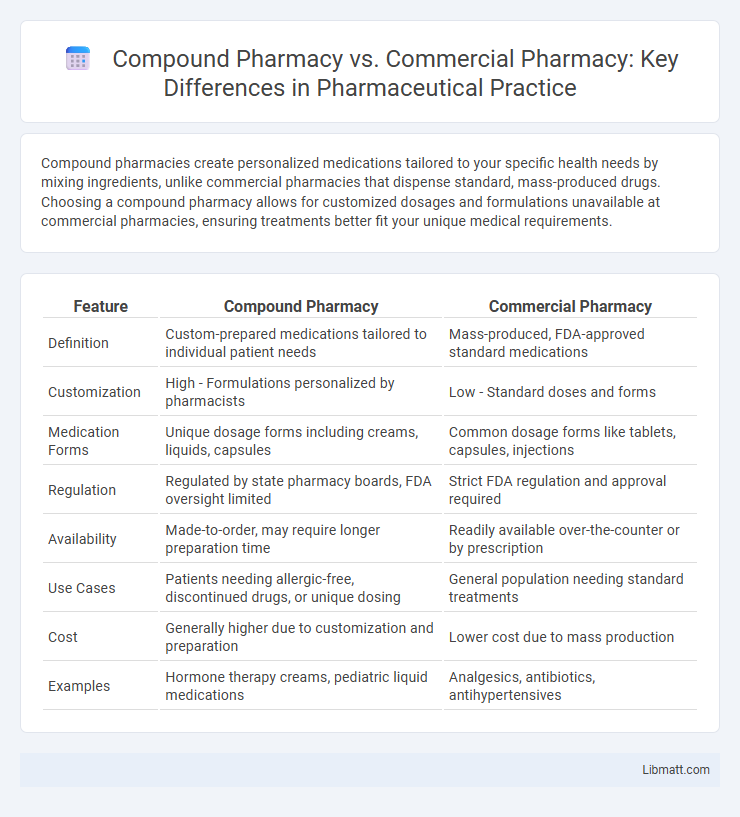Compound pharmacies create personalized medications tailored to your specific health needs by mixing ingredients, unlike commercial pharmacies that dispense standard, mass-produced drugs. Choosing a compound pharmacy allows for customized dosages and formulations unavailable at commercial pharmacies, ensuring treatments better fit your unique medical requirements.
Table of Comparison
| Feature | Compound Pharmacy | Commercial Pharmacy |
|---|---|---|
| Definition | Custom-prepared medications tailored to individual patient needs | Mass-produced, FDA-approved standard medications |
| Customization | High - Formulations personalized by pharmacists | Low - Standard doses and forms |
| Medication Forms | Unique dosage forms including creams, liquids, capsules | Common dosage forms like tablets, capsules, injections |
| Regulation | Regulated by state pharmacy boards, FDA oversight limited | Strict FDA regulation and approval required |
| Availability | Made-to-order, may require longer preparation time | Readily available over-the-counter or by prescription |
| Use Cases | Patients needing allergic-free, discontinued drugs, or unique dosing | General population needing standard treatments |
| Cost | Generally higher due to customization and preparation | Lower cost due to mass production |
| Examples | Hormone therapy creams, pediatric liquid medications | Analgesics, antibiotics, antihypertensives |
Introduction to Compound and Commercial Pharmacies
Compound pharmacies specialize in creating customized medications tailored to individual patient needs by mixing specific ingredients, dosages, and forms not available in standard commercial products. Commercial pharmacies primarily dispense pre-manufactured, FDA-approved medications in standardized doses and formulations for widespread patient use. Both pharmacy types play essential roles in healthcare, with compound pharmacies addressing unique therapeutic requirements and commercial pharmacies providing accessible, mass-produced medications.
Definition of Compound Pharmacy
Compound pharmacy specializes in creating personalized medications by mixing ingredients tailored to individual patient needs, such as unique dosages or allergy-friendly formulas. This practice contrasts with commercial pharmacies, which primarily dispense mass-produced, FDA-approved medications in standard dosages. Compound pharmacies play a critical role in customizing treatments for patients with specific health conditions or those requiring discontinued drugs reformulated.
Definition of Commercial Pharmacy
Commercial pharmacy involves the retail and distribution of ready-made medications produced by pharmaceutical companies, offering a wide range of standardized drugs for common health conditions. It operates through established supply chains and regulatory frameworks to ensure drug safety, efficacy, and availability to the general public. Unlike compound pharmacy, commercial pharmacy generally does not customize medications but focuses on mass-produced pharmaceutical products.
Key Differences Between Compound and Commercial Pharmacies
Compound pharmacies create personalized medications by mixing specific ingredients to tailor treatments for individual patients, while commercial pharmacies dispense mass-produced, FDA-approved drugs. Your needs may require a compound pharmacy when standard medications don't address unique health conditions or allergies, offering customized dosages and formulations. Commercial pharmacies provide convenience and wide availability of standardized medications for common treatments, but lack the flexibility of customized prescriptions found in compound pharmacies.
Benefits of Compound Pharmacies
Compound pharmacies provide personalized medication tailored to individual patient needs, offering unique formulations that are not available in commercial pharmacies. They accommodate allergies, specific dosages, and compounded flavors to improve adherence and effectiveness. This customization enhances treatment outcomes, especially for patients requiring specialized care or unavailable standard medications.
Advantages of Commercial Pharmacies
Commercial pharmacies offer a wide range of readily available medications, ensuring quick access to FDA-approved drugs with standardized quality and safety. They benefit from bulk purchasing, which often results in lower costs for common prescriptions and insurance coverage for many medications. Your convenience is enhanced through multiple locations, extended hours, and automated refill services, making medication management more efficient and reliable.
Common Medications in Compound vs Commercial Pharmacies
Compound pharmacies customize medications by combining active ingredients tailored to individual patient needs, frequently preparing hormone replacement therapies, dermatological creams, and pediatric formulations not readily available commercially. Commercial pharmacies typically stock mass-produced drugs such as standard antibiotics, analgesics, and cardiovascular medications that have FDA approval and widespread demand. The distinction lies in the personalized, variable-dose medications of compound pharmacies versus the uniform, mass-distributed products of commercial pharmacies.
Safety and Regulation Considerations
Compound pharmacies customize medications tailored to individual patients, operating under strict oversight by the FDA and state pharmacy boards to ensure formulation accuracy and sterility. Commercial pharmacies dispense FDA-approved drugs with standardized manufacturing processes, benefiting from rigorous quality controls and large-scale safety monitoring. Differences in regulation highlight that compound pharmacies carry higher risks related to contamination or dosage errors, necessitating enhanced vigilance in compounding practices and adherence to USP <797> and <800> guidelines.
Choosing Between Compound and Commercial Pharmacies
Choosing between compound and commercial pharmacies depends on your specific medication needs and preferences. Compound pharmacies create customized medications tailored to your unique health requirements, whereas commercial pharmacies provide standard, mass-produced drugs that are widely available. Your decision should consider factors such as personalized treatment, medication availability, and cost-effectiveness.
Future Trends in Pharmacy Services
Future trends in pharmacy services highlight the growing integration of personalized medicine, where compound pharmacies tailor medications to individual patient needs using advanced compounding techniques. Commercial pharmacies are increasingly incorporating automation and digital health technologies to streamline prescription fulfillment and enhance patient engagement. Your access to customized treatments and efficient pharmacy services will expand as these innovations reshape the pharmaceutical landscape.
Compound pharmacy vs commercial pharmacy Infographic

 libmatt.com
libmatt.com